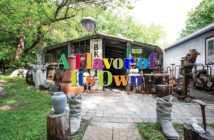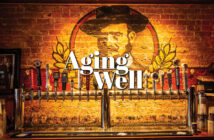| story by | |
| photos by | Steven Hertzog |
| OPEN A PDF OF THE ARTICLE |
Being a veterinarian can be a stressful profession, but the devotion of these local vets helps to ensure that our community’s animals are healthy and happy.
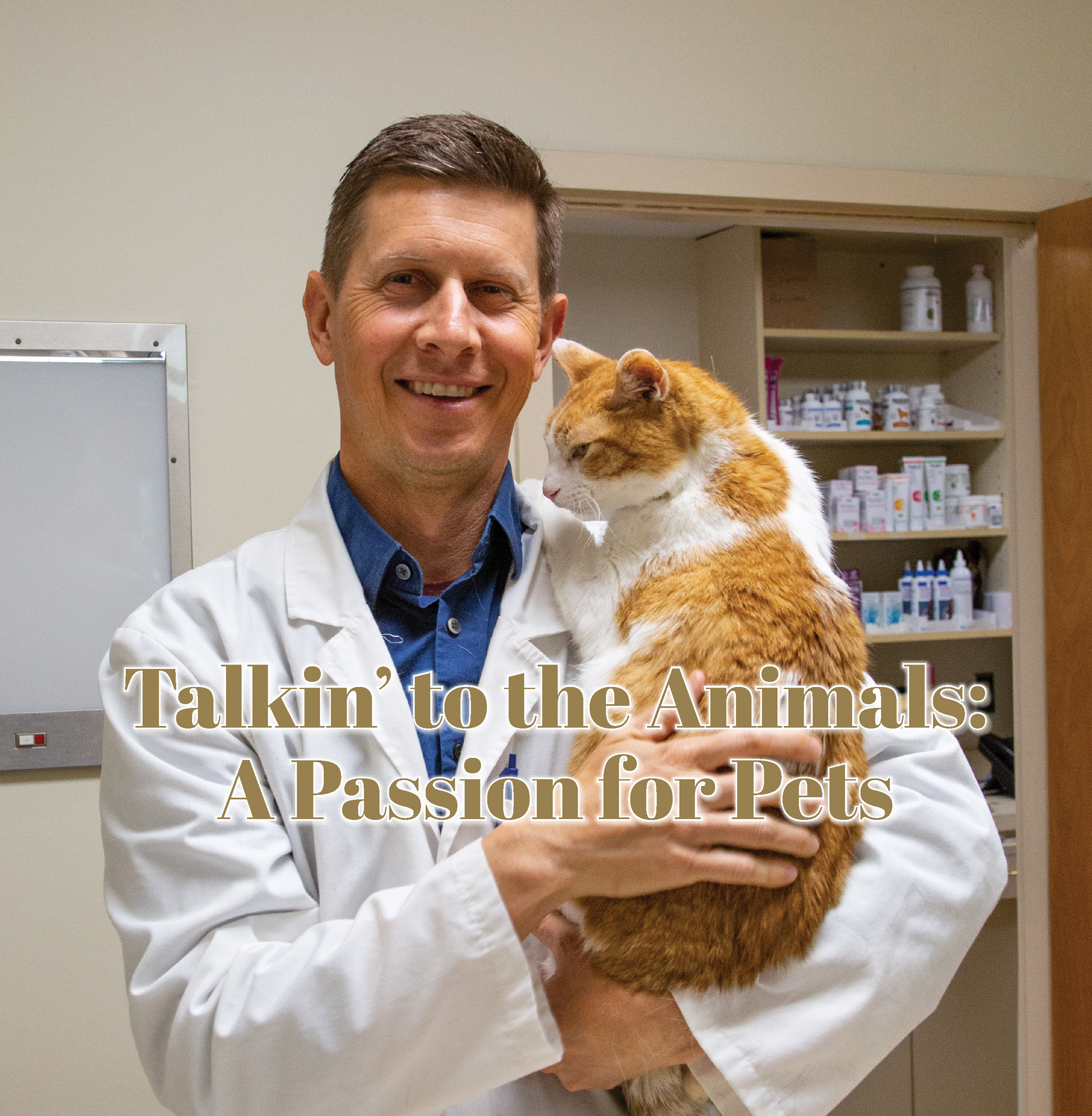
Dr. Mathew Coles, Animal Hospital of Lawrence, holds his patient before an exam
In May 1969, during a time of social upheaval in our country and in Lawrence, Dr. Herschel Lewis moved his family from El Dorado, Kansas, to Lawrence. The four years prior he’d spent in a large clinic learning the basics of running a veterinary practice. Here, he purchased a practice at Eighth and Vermont streets, which had been in service since 1932. The veterinarian changed the name, and the Lewis Veterinary Clinic was born.
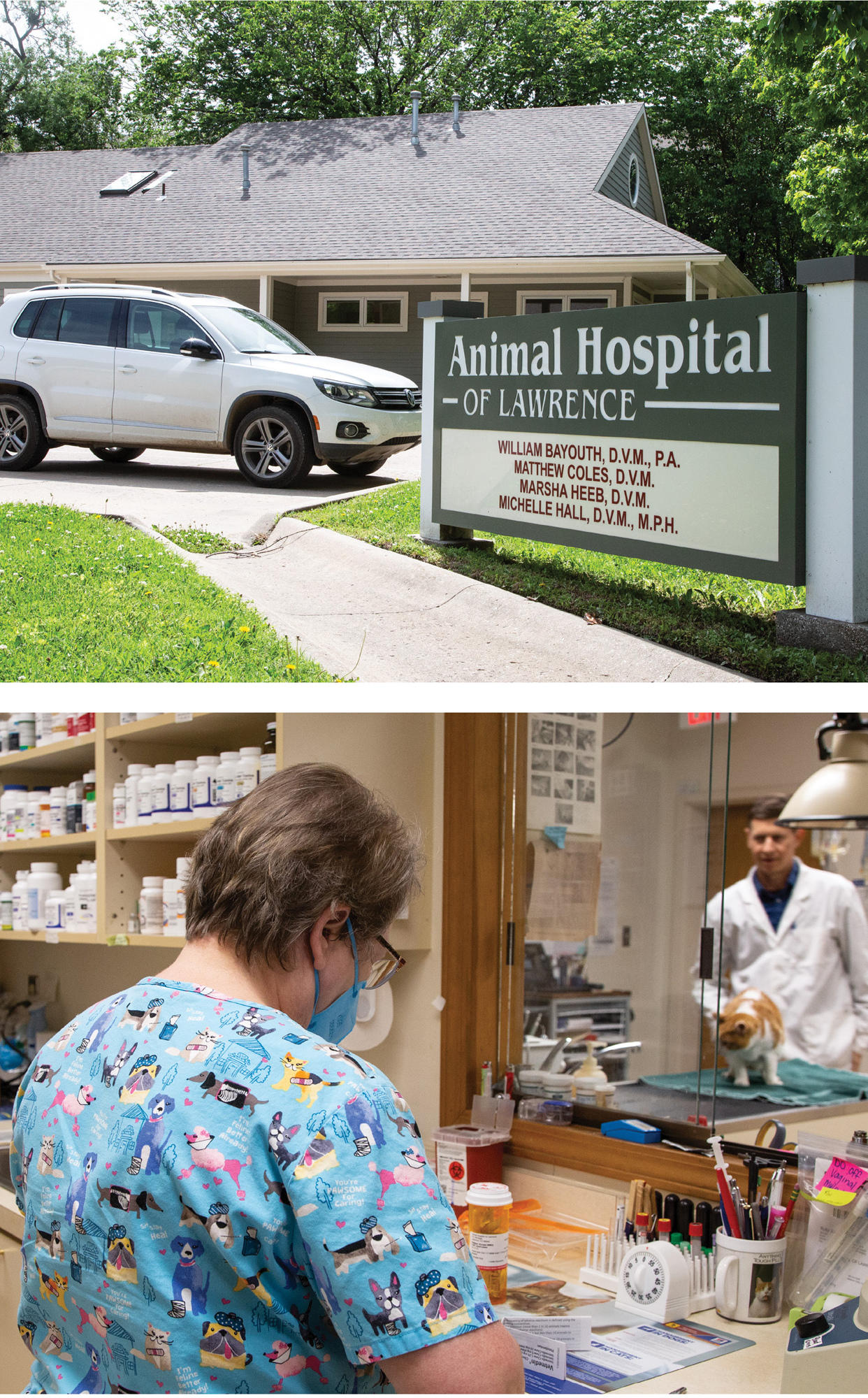
Entrance to Animal Hospital of Lawrence.; While Dr. Coles conducts an exam, a staffer prepares medication for another client
That same year, the phone rang in his clinic, and the frantic wife of another veterinarian in town was on the line. Thirty minutes before, during a routine cat spay, her husband had died. The new widow asked Lewis if he could quickly get across town to finish the surgery.
Though things have changed quite a bit in Lawrence since the year the first man landed on the moon, the Beatles recorded their last album together and close to 400,000 gathered for Woodstock, some things haven’t changed: the longevity of some of Lawrence’s best veterinary clinics, the camaraderie among the local vets—and Lewis’s phone number.
So how have these veterinary clinics endured throughout all of the changes in the world and in Lawrence in the last 50 years?
With a Little Help From My Friends
“I don’t know that it’s as much competition [but]probably more camaraderie,” explains Dr. Matthew Coles, veterinarian at Animal Hospital of Lawrence (AHL). “We have shared medications or vaccines with other clinics when they’ve been out or needed something, and they’ve shared with us when needed. We’ve also sent clients to other clinics when we can’t accommodate them or if their needs matched better elsewhere, such as wanting acupuncture.”
Lewis agrees. “Lawrence has a lot of clinics for clients to choose from. We all get along and trade information and services.” He believes his willingness to listen serves his clients well, and “if we cannot help them, we try to find someone who can.”
Although Lewis warns veterinary medicine can be quite an expensive endeavor, the U.S. Bureau of Labor Statistics (BLS) projects the need for veterinarians will continue to rise by 18% from 2018 to 2028, much faster than the average for job growth of all occupations. Overall employment of animal care and service workers is projected to grow 22 percent from 2019 to 2029, also faster than the average. The increase in consumers’ pet-related spending is the driving force behind these statistics.
The following three Lawrence veterinary clinics have stood the test of time and continue to thrive in the growing and ever-changing world of veterinary medicine.
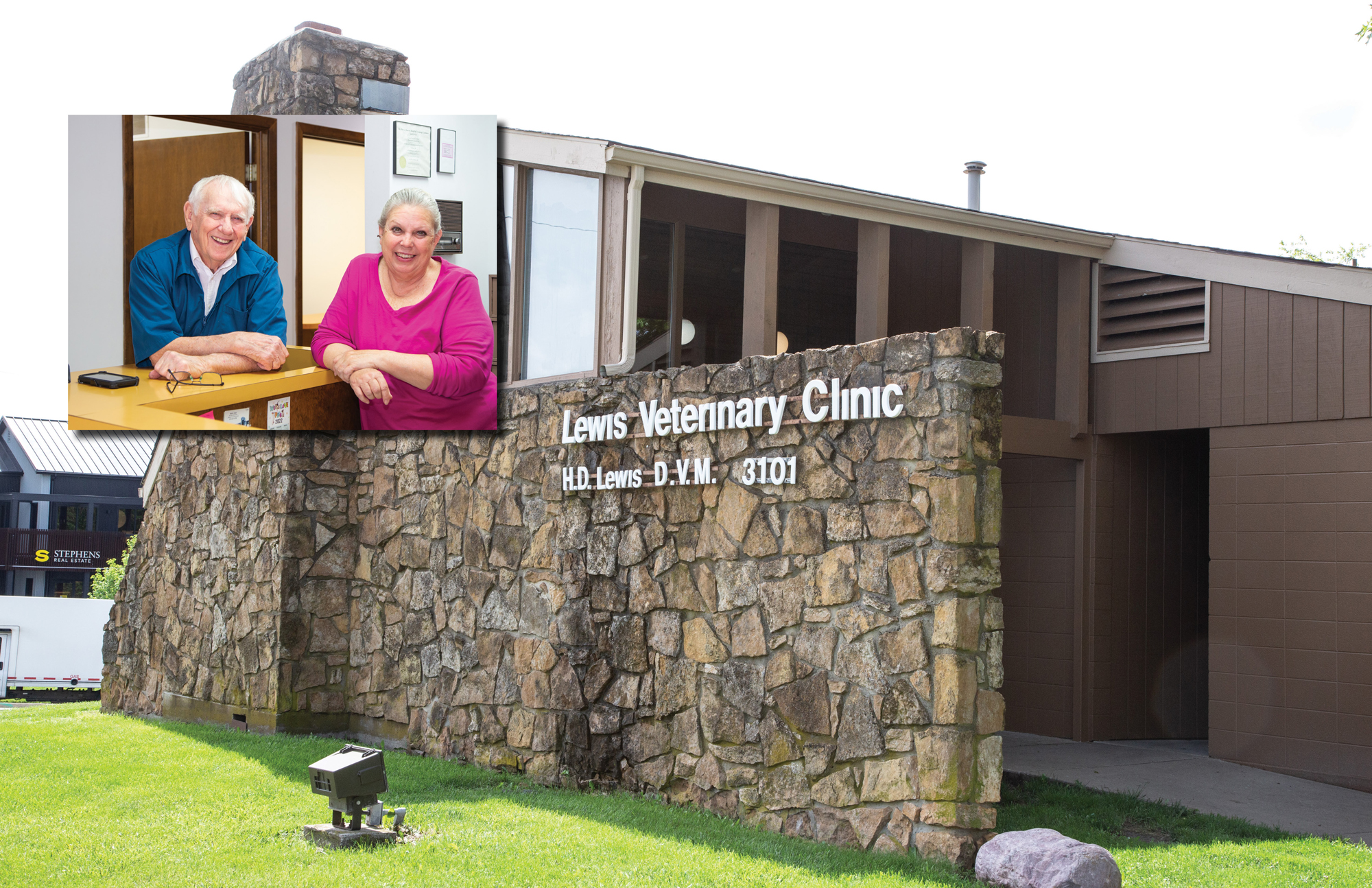
Lewis Veterinary Clinic; Dr Herschel Lewis and his assistant of 30 years Brenda Newell
Lewis Veterinary Clinic
In 1972, Lewis left his Vermont Street location and built his current clinic on West Sixth Street. He has been there ever since. In the early days, he provided services for both large and small animals, even working with the Lawrence livestock sales company. He also boarded animals at his clinic.
Lewis has one trusted employee, his receptionist of 30 years. Before that, he had another receptionist who was with him for 20 years. Since the clinic does not employ computers, his secretary has a big job not only handling clients and patients, but also keeping the books. “We have an understanding: She quits, I quit and vice versa,” Lewis says.
Though he rarely treats large animals these days and no longer offers boarding (he says both are labor intensive, and he’s grown too old), the Lewis clinic does accept walk-ins and offers health exams, vaccinations, 24-hour emergency care, antibiotics, heartworm preventatives, specialty pet food and spaying and neutering, among other offerings.
It also has a varied client base, from college students to businesspeople to second-and third-generation clients. “It amazes me the distance people will travel to come to the veterinarian they like,” Lewis says. “Many tell me they came with their grandparents and parents, and they bring me their new baby or spouse to show off.”
Lewis supports the 4-H of Douglas County when he can and says it’s always good to have a day off now and again. “But three days or more makes me nervous,” he quips.
Though his family arrived in Lawrence during a tumultuous time in history, he says the town has grown and lot and continues to do so while retaining its endearing small-town feel.
It’s “a growing community—close enough to big-city service but not too close,” Lewis explains. “Lawrence is a wonderful place, and I still enjoy my work.”
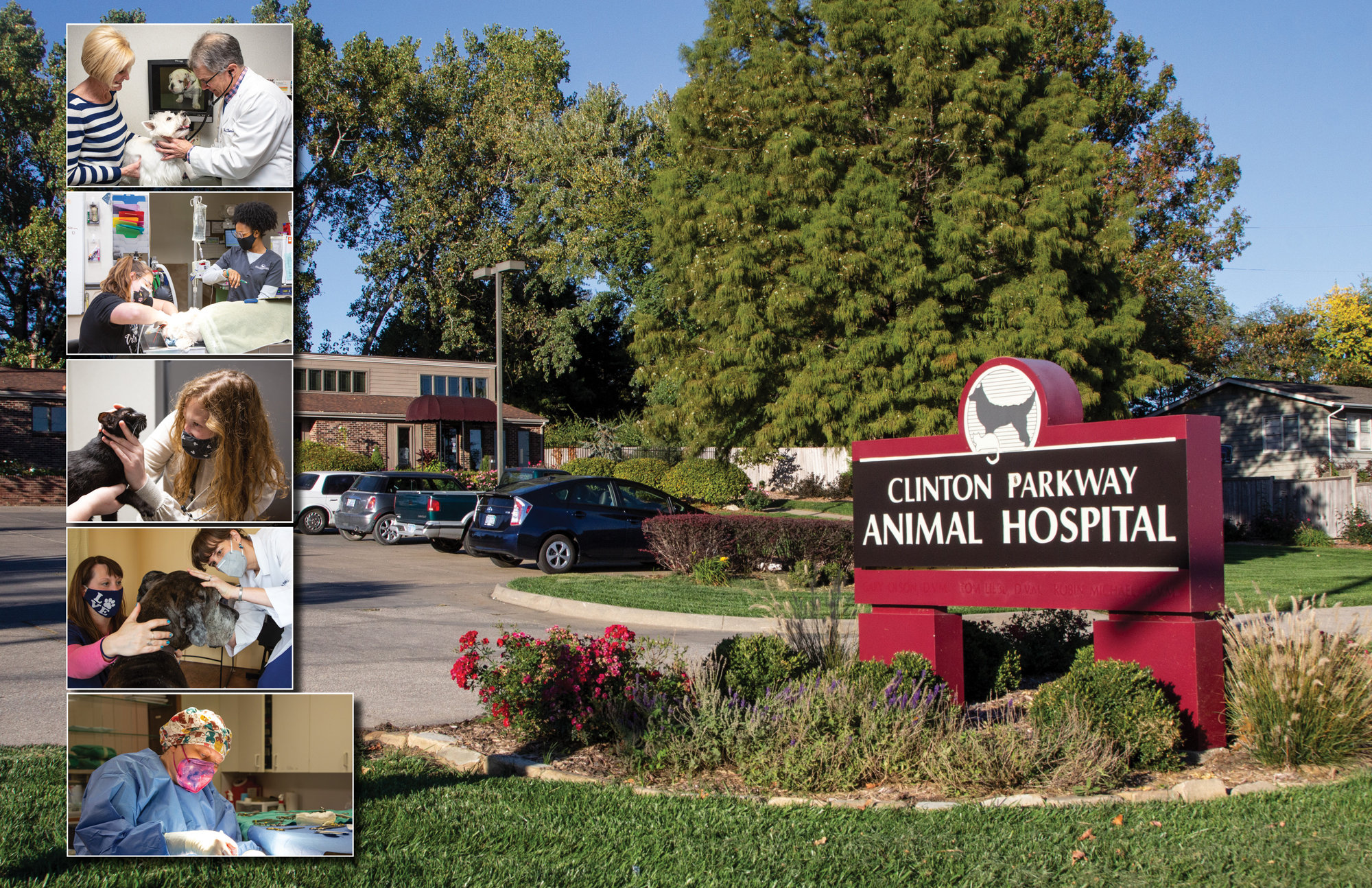
Clinton Parkway Animal Hospital; Top to bottom Dr. Tom Liebl examines a patient, a dog is getting a teeth cleaning; Dr. Rena Heimsoth examines a cat; Dr. Rhiannon Harris examines a very large dog; Dr. Miranda Lyon performs surgery in the CPAH operating room
Clinton Parkway Animal Hospital
After graduating from vet school in 1972 from Kansas State University, Dr. Gary Olson, veterinarian, and his wife moved to Elkhart, Indiana. “This area was one of the best in the country to practice quality veterinary medicine,” Olson says. “This exposure created a foundation on how I wanted to practice veterinary medicine.”
Soon after moving, the couple realized how special Kansas was. The family relocated to Lawrence in 1974 and opened Clinton Parkway Animal Hospital (CPAH) on 23rd Street (soon to be Clinton Parkway), at the time a narrow, two-lane asphalt road. The only other properties west of the clinic, at 4340 Clinton Pkwy., were a Montessori school and Clinton Parkway nursery.
“The clinic was surrounded by pastures,” says Olson, who retired in 2021. “One day during construction, the painters left the doors open for ventilation. I discovered the next morning that a steer with long horns had entered the building, walking around different rooms. Lots of manure but luckily no significant damage.”
A few years later, construction began on Clinton Parkway, obstructing access to the clinic. Clients had to take Sixth Street to Wakarusa (a gravel road used as a drag strip at the time) and then a couple miles back on other gravel roads just to get to the clinic, he explains. “It would end up being almost a five-mile trip. I remember a potential client calling with an emergency who needed to come to the clinic right away. He became so frustrated with my directions that he decided to go to another clinic.”
Another well-dressed female client ended up getting chains from the contractor wrapped around her tires trying to make it to the clinic, Olson says. “She was covered in mud. We sent her flowers, and she remained a great client for many years. That’s loyalty.”
Luckily, CPAH had then and still has to this day very loyal clients.
Olson says he chose Lawrence because it’s a college community, has a larger population and was experiencing significant growth at that time. “Lawrence is a great asset for new employees. … [And] an educated client base is helpful.
“Downtown was vibrant with multiple specialty stores. We had many business leaders who could get things done for the best of Lawrence,” he continues.
Having been named Best of Lawrence for six years, the foundation of the practice was based on decisions made by Olson in 1974. The clinic had state-of-the-art equipment, Olson explains, and the goals of the practice were based on his experience in Indiana.
Today, Dr. Tom Liebl, veterinarian, runs the show. The clinic “has a staff that takes a keen interest in the ‘whole’ (gets to know and understand the client, takes an interest in the clientele, knows the needs of the pet and wants to do everything possible to make that pet feel comfortable, happy and healthy).” Its mission: considering its clients and their pets a part of the CPAH family with a staff that provides a standard of care founded on compassion and a deep commitment to providing the best care and value possible.
He says his staff “are truly warriors that hold the goal of providing top medical care to our clients’ pets near and dear.”
The clinic has about 25 employees including the practice manager, receptionist, technicians, technician assistants and kennel staff who oversee client interactions, prepare paperwork, handle financial interactions, assist the doctors in evaluating patients and preparing samples for submission to labs, administer vaccines/medications and perform diagnostic tests required for patient care, Liebl explains. It offers everything from health checks, dental health care, overweight and pain management, senior pet care, vaccinations, spay and neutering, and other types of surgeries, among other services.
Recently, the clinic worked with the local pet food pantry, giving a portion of the money collected from every office call to the pantry to buy food for the pets of those who were down on their luck. “We also provide the opportunity for school children who have an interest in the profession of veterinary medicine to come and spend time with us as a shadowing opportunity,” he says. “It has been rewarding to see some of those young ones go on to fulfill their dreams and let us know that we played a role in their decision.”
Animal Hospital of Lawrence
Founded around 1972 as the Animal Hospital of Old West Lawrence, Dr. William Bayouth, veterinarian, purchased the practice, located at 701 Michigan St., in 1977 and shortened the name to Animal Hospital of Lawrence (AHL). He had been living and practicing in Colorado, and decided to move to Lawrence to be closer to family and friends.
Before he bought the clinic, Seventh Street was a main thoroughfare through town from east to west. “That’s likely why the clinic is where it is now. … Over time, Sixth Street became the main east/west street from downtown,” explains Coles, current owner of AHL.
“The west wasn’t there,” Bayouth says. “Wakarusa was pastureland. Kasold was the edge of town.”
Today, Coles adds, Lawrence is just bigger and more complicated.
The secret to AHL’s success seems to be its ability to form and retain relationships with clients. “We don’t really advertise, and we aren’t on a main street. Just word of mouth and building relationships with people who have referred others,” Coles explains. “We have people who have been coming here since before Bill bought the clinic—a handful of clients for over 45 years and still others over 40 years. We have 20 or so clients that have moved away and still drive over from the KC area for appointments.”
He says they strive to be affordable and honest, and just focus on helping pets and people.
The clinic has about 15 staff including kennel, reception, veterinarians, technicians and assistants. It has had some employees remain with the clinic for 20 to 25 years. It offers wellness care such as dentistry, vaccinations, checkups, spay and neuter surgeries; specialty care such as allergy, emergency, end of life, lab and radiology treatments; and additional care such as boarding, food and treats, and pet-care supplies.
Coles says the advantage of running a clinic in Lawrence is the small-town feel and being in a neighborhood setting where people can walk to the clinic. The disadvantage, he says, is not having an emergency clinic or a closer referral for specialists.
Bayouth and Coles both give back to the community in their own ways. Bayouth volunteers with various groups and was on the board of the Ballard Center for many years. Coles has been volunteering with Meals on Wheels for about 14 years.
The clinic’s ultimate goal: “Put simply, to keep people and their pets together,” Coles explains. “Or more traditionally, furthering the relationship between pets and their people through improved pet health.
“We seem to develop relationships that last,” he adds.
Power of Community
Today’s veterinarians are the only doctors educated to protect the health of both animals and people (zoonotically), according to the American Veterinary Medical Association (AVMA). “They work hard to address the health and welfare needs of every species of animal. Veterinarians also play critical roles in environmental protection, research, food safety and public health,” the AVMA states.
As such an integral part of the community, performing such a challenging and emotional service, working together for the greater good and supporting one another during the process is key. “We are in a service industry that sees some very stressful, sad situations and also some situations that fill the heart with a warm glow. … We rely on each other to help carry the burden.”


